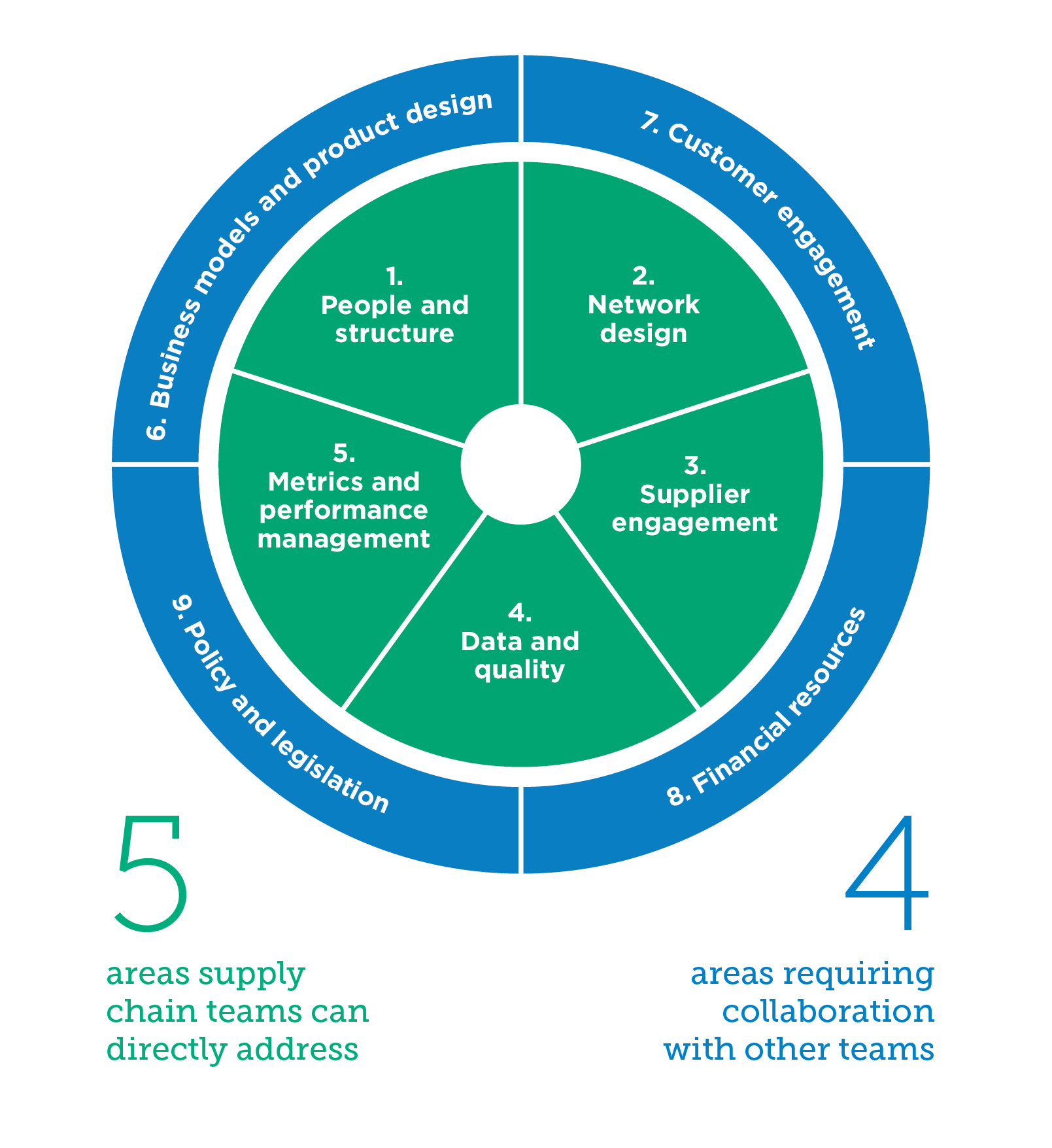This sprint will bring together leaders from multiple industries to develop practical strategies, explore collaborative opportunities, and build compelling business cases towards the transformation of supply chains for a circular economy.
Supply chain transformation sprint
IN PERSON DATE: LONDON, 17 - 19 JUNE
Many businesses in our Network are finding ways to scale circular business models, with supply chain professionals tasked with advancing concepts into pilot projects, and bringing pilots to scale. This sprint will build on our 2024 supply chain sprint, which focused on the capabilities required for circular supply chain transition. Our 2025 sprint will support professionals building a compelling business case for supply chain transformation, including the role of collaboration, and how to navigate policy and regulation.
This sprint will be delivered in collaboration with Deloitte, leveraging their expertise across supply chain transformation, business case development, and regulation.
Focus areas
There are nine focus areas for circular supply chains from our white paper.

This sprint will focus on:
Building the business case: metrics and financial resources (Focus areas 5 and 8)
Network design and archetypes for supply chain collaboration (Focus area 2)
Navigating policy and legislation (Focus area 9)
Building the business case: metrics and financial resources
Measuring circular supply chain success with the same metrics used for linear supply chains will not fully capture the value created, and since investment decisions are still largely aligned with linear thinking, securing appropriate investment will require new approaches.
During the sprint, we will explore the fundamentals of building a business case for supply chain transformation, focusing on establishing performance indicators that monitor and drive success in a circular supply chain. We will delve into strategies for securing necessary levels of investment, crafting a value proposition that resonates with different functions, and aligns with the evaluation criteria used by finance departments.
Archetypes for supply chain collaboration
Today’s supply chain networks — from partnership and ownership structures to the systems, infrastructure, and technologies that support them — are primarily built to optimise for forward, rather than backward, flows of products and materials. Key considerations when moving to a circular supply chain include whether to manage activities in-house, outsource them, or build partnerships with competitors or adjacent industries.
During the sprint, we will facilitate discussions on opportunities for commercially-driven collaboration across the supply chain, and explore potential support for onward collaborative projects.
Navigating policy and legislation
Supply chain leaders operating across national and regional borders transitioning to circular practices face the challenge of complying with fragmented and sometimes conflicting legislation and taxation, exacerbated by a lack of common standards and definitions.
During the sprint, we will tackle this in two dimensions:
We will tap into external expertise and shared experiences from the sprint participants, to explore how today’s legislative barriers can be turned into opportunities to drive innovation, such as deploying regional infrastructure to enable material circulation.
We will broker discussions with those working in internal public affairs departments to build an understanding of the advocacy needed to better support circular supply chains, covering areas such as resource classifications, taxation and fee incentives, standards, and investments in infrastructure or skills.
Sprint objectives
Equip participants with tools and frameworks to build a compelling business case for supply chain transformation, focussing on developing metrics, quantifying benefits, and securing financial resources
Identify key collaboration opportunities that would bolster circular supply chains, such as shared infrastructure or joint R&D, leading to potential future collaborative projects with the Ellen MacArthur Foundation
Navigate the policy and legislative landscape impacting supply chain transformation and engage with public affairs colleagues to define the advocacy needed to enable and accelerate the creation of circular supply chains
What will happen during the sprint?
DAY ONE
Recap on circular supply chain capabilities and implications for business case development
Case studies and success stories
Business case fundamentals masterclass
Supporting your business case with existing data and system landscape
DAY TWO
Exploring the policy landscape and the impact on the business case
Quantifying circularity benefits
Cost analysis and funding opportunities
Network design and framing collaboration opportunities
Risk assessment and mitigation
DAY THREE
Storytelling and stakeholder communication masterclass
Cross sector exchange and feedback to refine your business case
Implementation and collaboration next steps planning
Capture individual and collective learnings
What will I gain from being part of the supply chain sprint?
Advancement of an existing business case through an in-depth understanding of key considerations and methods to build a business case for circular supply chains
Connections and opportunities to collaborate with others
A better understanding of how to navigate the policy landscape
Who should attend?
We require two participants per organisation to attend together. One senior supply chain professional, plus one colleague from another relevant function, such as sustainability/circular economycircular economyA systems solution framework that tackles global challenges like climate change, biodiversity loss, waste, and pollution. It is based on three principles, driven by design: eliminate waste and pollution, circulate products and materials (at their highest value), and regenerate nature., procurement, technology, or public affairs
An advanced understanding of the circular economy is highly desirable but not essential
When applying, please share the supply chain related business case you would like to accelerate during the sprint
Who else will be in the room?
This sprint is cross-sector, so a range of industries will be present.
Time involvement for the sprint
The sprint consists of:
Pre-work: two hours (pre-read)
In person: 2.5 days (in person in London)
Catch up on the webinar
Watch the recording of the webinar where we provide an introduction to our sprint programme and details on the upcoming 'supply chain transformation' sprint.
Apply
Apply to join the supply chain transformation sprint here:

